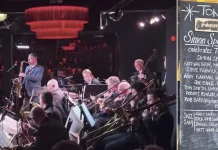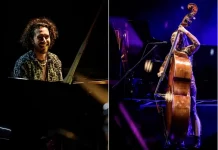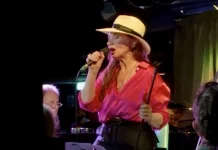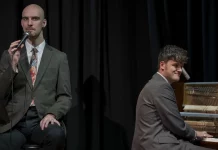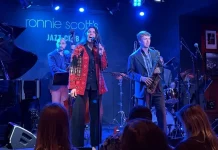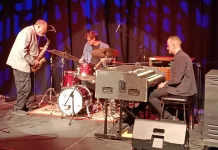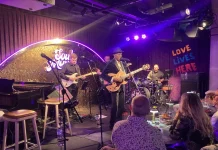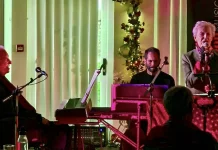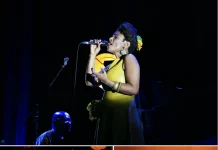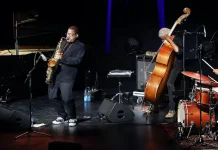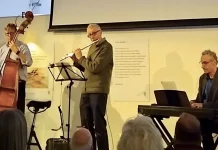Mountain tops lack snow but Tallin did not, at least for the first days of the one-week Jazzkaar festival taking place for the 35th time, 21-28 April. Luckily, the weather gradually changed and the last three days were sunny and warm.
Under the direction of an enthusiastic and young-at-heart lady named Anne Erm, the festival mingled international headliners, local bands and lesser known international names. Over the course of its already long history, many jazz stars have entertained an ever-increasing audience. And so the 35th anniversary was a great opportunity to organise a small open-air picture exhibition right in front of the main venue.
JAIK and the adjacent Fotografiska venue hosted most of the gigs with the exception of the studio concerts and the Snarky Puppy sold-out gig which took place at the Alexela Kontserdimaja in front of some 2,000 attendees. As incredible as it may seem, it was the first time that Michael League’s band had made it to the Baltic states and their Tallinn concert was to be followed the same week by performances in Riga and Kaunas. For the past 19 years, Snarky Puppy and its evolving line-up has built up a particular sound that seems to always hit its target, gig after gig.
The energetic super group was echoed the next day by JT Conception, an Estonian 10-piece with quite a similar instrumentation. JT are the initials of the band leader, Janno Trump, who luckily has no connection whatsoever with the infamous former US president. To present their fresh and third studio album How Far Can We Go?, the multi-award-winning bass leader had the great idea to invite on stage the young and dynamic Danish harmonica player Mathias Heist.
Their top-notch performance was preceded by the 18th Estonian Jazz Awards ceremony which notably celebrated pianist Kirke Karja both as the best composer of the year and best ensemble for her trio album. Her new trio album is to be released shortly on BMC Records.
Friday evening at Jazzkaar was definitely a time to party as if it’s 1999. Prince’s lyrics seem to have a stronger significance in 2024 than they did at the turn of the century. His spirit was certainly floating above us when Dwayne Thomas Jr., aka MonoNeon, took to the JAIK stage following JT Conception’s gig at Fotografiska. The bassist-vocalist was invited by Prince to his Paisley Park studio back in 2015 and it is certainly the case that Prince’s influence is very much present in MonoNeon’s groovy pieces. The best part of MonoNeon’s performance was another popup for unexpected guest Matthias Heist on a couple of tunes.
What matters most in a jazz festival is to create a sort of symbiosis between the musicians and the audience. It is especially remarkable when the project is not necessarily very accessible. Such was the case on Thursday night with human beatbox and vocalist Andreas Schaerer joined on stage by Finnish guitar player Kalle Kalima and by Björn Meyer, who was replacing the regular bassist, Tim Lefebvre. The trio really has a universe of its own which it shared with the audience in an intimate and friendly manner. The same could be said about the performance by Brazilian singer-songwriter Dora Morelenbaum. Unlike the Bala Desejo quartet in which she plays as well, her intimate duo with guitarist Guilherme Lirio invited us to imagine relaxing on a Brazilian beach or even in a hammock somewhere along the Amazon as she sang a traditional tune in an indigenous Brazilian language.
One of the specialities of Jazzkaar is a few intimate concerts held in various studios across the city. This was the perfect opportunity for avant-garde pianist Kirke Karja to display her improvisational talent in front of a selected audience. Other studio concerts involved notably female composers such as Rita Ray and Alonette, the latter more in the pop-folk category.
When assembling the programme, Anne Erm had not yet realised how many bass leaders would follow one another on the various stages during the second half of the festival: five in total. Among them, Christian McBride’s quintet was a must-see gig. The eight-time Grammy winner was returning to Tallinn after being there as part of Chick Corea’s trio back in 2012. Besides paying homage to the late master with a cover of La Fiesta, McBride’s young crew delivered an impeccable set of originals written mainly by the bass leader. Ending the gig with a brand-new tune written for electric bass (Brouhaha), McBride had the crowd stamping its feet when he started singing “Shake your booty at the disco”.
After a jazz-fusion interlude with Estonian guitar player Karl Madis Pennar’s sextet, the jazz party ended beautifully with New Orleans-born Ledisi and her Nina Simone tribute. As she recalls, listening to Nina Simone on the radio literally saved her life at a time of profound despair. So it made perfect sense for the award-winning vocalist to perform a repertoire of the late composer. Dusting off Nina Simone’s best-known piece with her own improvised lyrics (“Beyonce’s not his style, not even Michelle Obama’s smile, my baby just cares for, my baby just cares for me…”) she went on with a kaleidoscope of originals and covers. Just as with Deborah Brown at the 2023 Ystad Jazz Festival, there came a time when she could not bear her high-heeled shoes, taking them off as the crowd started to dance and clap.
When Anne Erm decided to create the Jazzkaar festival back in 1990, one year before Estonia finally regained its independence, little did she know that it would one day become the biggest of its kind in the Baltic states. Like all her countrymen at the time, Anne had had to endure USSR oppression. Serving as a reminder that such oppression still prevails in Russia, a walk along Pik Street will bring you to the fences of the Russian Embassy on which can be seen many dead flowers, Navalny pictures and anti-war posters. At the end of the same street stands the infamous KGB HQ and the cellar cells which you can visit today. There, posters of Russian political prisoners in 2024 exemplify the sort of regime that was imposed before 1990 in too many European countries. Against this, the Jazzkar festival serves as a emblem of freedom.


